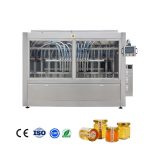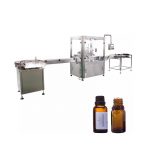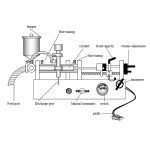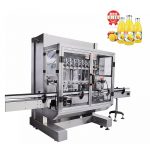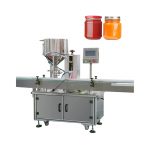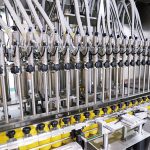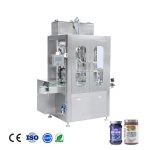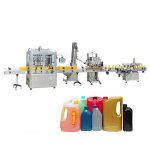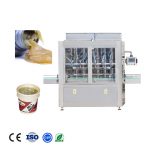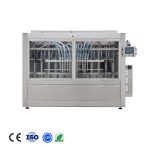What is industrial bottle filling machine?
An industrial bottle filling machine is a machine that is used to fill containers, such as bottles, with a product. These machines are typically used in manufacturing and packaging operations and can be used to fill a variety of products, including liquids, powders, and granules. Industrial bottle filling machines are designed to be fast and efficient, and they can fill hundreds or thousands of bottles per hour, depending on the size and speed of the machine. They are typically made from stainless steel or other durable materials to withstand the demands of an industrial environment. Some common features of industrial bottle filling machines include programmable filling volumes, accurate filling nozzles, and conveyor belts to transport the bottles through the filling process.
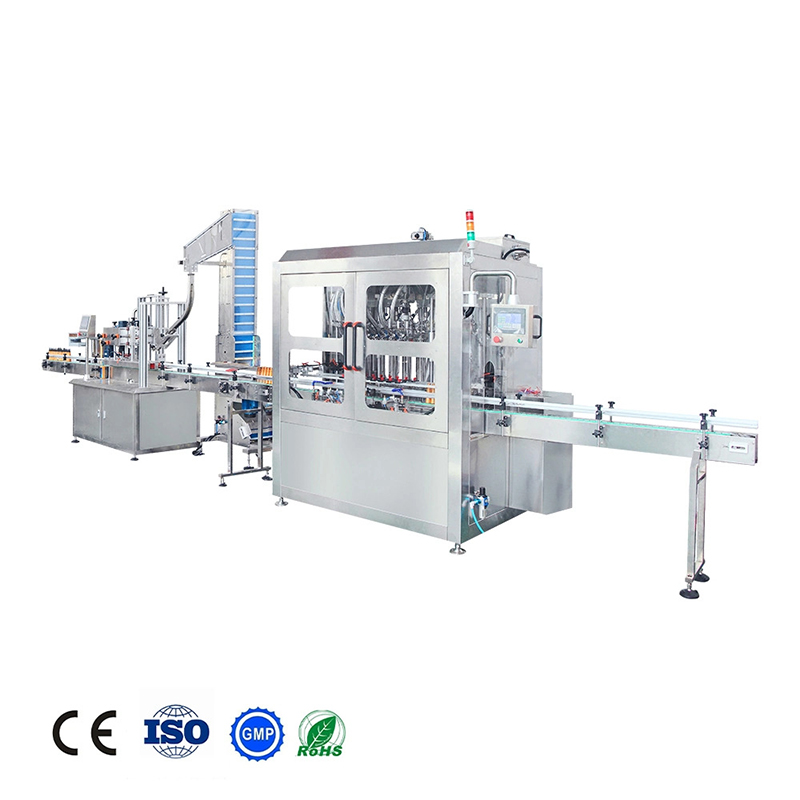
What types of bottles can the machine handle?
Industrial bottle filling machines are typically designed to handle a range of bottle sizes and shapes. The size and shape of the bottle that the machine can handle will depend on the specific design of the machine. Some bottle filling machines are able to handle a wide range of bottle sizes, while others are more specialized and can only handle a narrow range of bottle sizes.
In general, industrial bottle filling machines are designed to handle bottles with a volume of between a few ounces and several gallons. The bottles that the machine can handle may be made from a variety of materials, including glass, plastic, and metal. The shape of the bottle can also vary, and industrial bottle filling machines are often able to handle bottles with irregular shapes or contours.
What types of liquids can the machine fill?
Industrial bottle filling machines can be used to fill a wide variety of liquids, including water, juice, soda, beer, wine, dairy products, cleaning products, and more. The specific types of liquids that a particular bottle filling machine can handle will depend on the design and construction of the machine. Some bottle filling machines are designed to handle only thin, low-viscosity liquids, while others are able to handle thicker, more viscous liquids.
In general, industrial bottle filling machines are designed to be versatile and can handle a wide range of liquids. They often have features such as adjustable filling nozzles and programmable filling volumes that allow them to accommodate different types of liquids. Some bottle filling machines are also equipped with specialized pumps or other components that are designed to handle specific types of liquids, such as thick or abrasive liquids.
What types of industrial bottle filling machine?
There are a number of different types of industrial bottle filling machines that are used in manufacturing and packaging operations. The specific type of bottle filling machine that is best suited for a particular application will depend on a number of factors, including the type of product being filled, the volume of product being filled, and the size and shape of the bottles being filled.
Here are a few common types of industrial bottle filling machines:
Volumetric fillers:
These types of bottle filling machines are designed to fill a specific volume of product into each bottle. They typically use a series of filling nozzles or tubes to dispense the product into the bottles, and the filling volume is controlled by adjusting the size of the nozzles or the speed at which the product is dispensed.
Gravimetric fillers:
These types of bottle filling machines are designed to fill a specific weight of product into each bottle. They use a weighing mechanism to measure the weight of the product being filled, and the filling process is controlled by adjusting the flow rate of the product.
Net weight fillers:
These types of bottle filling machines are similar to gravimetric fillers, but they are designed to fill a product to a specific net weight, rather than a gross weight. This means that the weight of the bottle and the filling material is taken into account when filling the product.
Piston fillers:
These types of bottle filling machines use a piston or other mechanical device to dispense the product into the bottles. They are typically used for filling products with a high viscosity or for filling precise volumes of product.
Gravity fillers:
These types of bottle filling machines use the force of gravity to fill the bottles with the product. They are typically used for filling liquids and are often used for filling large volumes of product.
How accurate is the filling process?
The accuracy of the filling process will depend on the specific bottle filling machine being used and the requirements of the application. In general, industrial bottle filling machines are designed to be accurate and consistent, with a high degree of filling accuracy.
Many bottle filling machines have features that help to ensure accurate filling, such as programmable filling volumes and precise filling nozzles. Some bottle filling machines also have features that allow for fine-tuning of the filling process, such as adjustable filling speeds and the ability to make fine adjustments to the filling volume.
In addition to the features of the bottle filling machine, the accuracy of the filling process can also be influenced by factors such as the viscosity of the liquid being filled, the temperature of the liquid, and the condition of the bottles being filled. Factors such as these can affect the flow rate of the liquid and the accuracy of the filling process.
How fast can the machine fill bottles?
The speed at which an industrial bottle filling machine can fill bottles will depend on a number of factors, including the size of the machine, the type of product being filled, and the volume of the bottles being filled. In general, larger and more powerful bottle filling machines are able to fill bottles at a faster rate than smaller, less powerful machines.
A typical industrial bottle filling machine can fill hundreds or thousands of bottles per hour, depending on the size and speed of the machine. For example, a small tabletop bottle filling machine may be able to fill a few hundred bottles per hour, while a larger, high-speed bottle filling machine may be able to fill several thousand bottles per hour.
The speed at which a bottle filling machine can fill bottles can also be influenced by factors such as the viscosity of the product being filled, the temperature of the product, and the condition of the bottles being filled. Factors such as these can affect the flow rate of the product and the overall speed of the filling process.
Can the machine handle different bottle sizes or shapes?
The ability of an industrial bottle filling machine to handle different bottle sizes and shapes will depend on the specific design of the machine. Some bottle filling machines are able to handle a wide range of bottle sizes and shapes, while others are more specialized and can only handle a narrow range of bottle sizes and shapes.
In general, bottle filling machines that are designed to handle a wide range of bottle sizes and shapes will have features such as adjustable filling nozzles and conveyor belts that can accommodate different bottle sizes and shapes. These types of machines may also have programmable filling volumes that allow them to fill different volumes of product into different bottles.
On the other hand, bottle filling machines that are more specialized and can only handle a narrow range of bottle sizes and shapes will typically be designed specifically for a particular bottle size or shape. These types of machines may not have as much flexibility when it comes to filling different bottle sizes and shapes.
What type of maintenance is required for the machine?
The type of maintenance that is required for an industrial bottle filling machine will depend on the specific design and construction of the machine, as well as the conditions in which it is used. In general, bottle filling machines require relatively low levels of maintenance, but there are a few key tasks that should be performed on a regular basis to ensure that the machine is operating properly.
Some common maintenance tasks for bottle filling machines include:
Cleaning:
Bottle filling machines should be kept clean to prevent contamination of the product being filled and to ensure that the machine is operating efficiently. This may involve regularly cleaning the filling nozzles and other parts of the machine to remove any build-up of product or debris.
Lubrication:
Many bottle filling machines have moving parts that require lubrication to operate smoothly. These parts should be lubricated on a regular basis to ensure that the machine is running smoothly and efficiently.
Inspection and maintenance of mechanical components:
The mechanical components of a bottle filling machine, such as bearings, gears, and conveyor belts, should be inspected regularly for signs of wear or damage. Any components that are damaged or worn should be replaced to ensure that the machine is operating properly.
Calibration:
Bottle filling machines should be calibrated regularly to ensure that they are filling the correct volume of product. Calibration may involve adjusting the filling nozzles or other parts of the machine to achieve the desired filling volume.
In addition to these regular maintenance tasks, it is also important to perform periodic maintenance on the machine, such as replacing worn or damaged parts, to ensure that it is operating at peak performance.
What type of power source does the machine use?
Industrial bottle filling machines typically use an electric power source, such as a standard wall outlet or a dedicated electrical circuit. The specific power requirements of a bottle filling machine will depend on the size and design of the machine, as well as the type of product being filled.
In general, bottle filling machines are designed to be energy efficient and use relatively low levels of power. The power consumption of a bottle filling machine will depend on a number of factors, including the speed of the machine, the volume of product being filled, and the type of product being filled.
Some bottle filling machines may also have additional power requirements for features such as heating or cooling systems, pumps, or other specialized equipment. In these cases, the machine may require a higher power supply or a dedicated power source to operate these features.
What type of warranty or technical support is offered?
The type of warranty and technical support that is offered for an industrial bottle filling machine will depend on the manufacturer of the machine and the specific terms of the warranty. In general, bottle filling machines are durable and reliable, and they often come with a warranty that covers defects in materials or workmanship.
Warranties for bottle filling machines can vary widely in terms of length and coverage. Some manufacturers may offer a limited warranty that covers the machine for a specific period of time, such as one year, while others may offer a longer, more comprehensive warranty. Some warranties may cover only certain parts of the machine, while others may provide more comprehensive coverage.
In addition to a warranty, many manufacturers of bottle filling machines also offer technical support to their customers. This can include assistance with installation, operation, and maintenance of the machine, as well as troubleshooting and repair services. Technical support may be provided through a variety of channels, such as phone, email, or online resources.
What is the price range for this type of machine?
The price of an industrial bottle filling machine can vary widely, depending on a number of factors, including the size and capacity of the machine, the features and capabilities of the machine, and the manufacturer of the machine. In general, bottle filling machines can range in price from a few thousand dollars for a small, basic machine, to hundreds of thousands of dollars for a large, high-capacity machine with advanced features.
A number of factors can influence the price of a bottle filling machine, including:
Size and capacity:
Larger, more powerful bottle filling machines with higher filling capacities are generally more expensive than smaller, less powerful machines with lower filling capacities.
Features and capabilities:
Bottle filling machines with advanced features, such as programmable filling volumes, multiple filling nozzles, and specialized pumps, will generally be more expensive than machines with more basic features.
Manufacturer:
The price of a bottle filling machine may also be influenced by the manufacturer of the machine. Machines from well-known, established manufacturers may be more expensive than those from lesser-known or newer manufacturers.
In general, the price of a bottle filling machine will depend on the specific needs and budget of the buyer. It is important to carefully consider the features and capabilities of the machine and to compare prices from multiple sources to find the best value.
Can the machine handle different viscosities of filling products?
The ability of an industrial bottle filling machine to handle different viscosities of filling products will depend on the specific design of the machine. Some bottle filling machines are designed to handle only thin, low-viscosity liquids, while others are able to handle thicker, more viscous liquids.
In general, bottle filling machines that are designed to handle a wide range of viscosities will have features such as adjustable filling nozzles and pumps that can accommodate different viscosities of product. These types of machines may also have programmable filling volumes and filling speeds that allow them to fill different volumes of product into different bottles at different speeds.
On the other hand, bottle filling machines that are more specialized and can only handle a narrow range of viscosities will typically be designed specifically for a particular viscosity of product. These types of machines may not have as much flexibility when it comes to filling different viscosities of product.
In order to determine whether a particular bottle filling machine can handle a specific viscosity of product, it is best to consult the manufacturer or the machine's documentation. The manufacturer should be able to provide information on the machine's capabilities and whether it is suitable for filling products with a particular viscosity.
Can the machine handle hot filling products?
The ability of an industrial bottle filling machine to handle hot filling products will depend on the specific design of the machine. Some bottle filling machines are equipped with features that allow them to handle hot filling products, while others are not designed to handle hot products.
Bottle filling machines that are designed to handle hot filling products will typically have features such as heat-resistant filling nozzles and temperature-controlled filling chambers. These types of machines may also have specialized pumps or other components that are designed to handle hot products.
On the other hand, bottle filling machines that are not designed to handle hot filling products may not have these types of features, and they may not be able to withstand the high temperatures of hot products. Using a bottle filling machine that is not designed to handle hot products to fill hot products can result in damage to the machine or other problems.
In order to determine whether a particular bottle filling machine can handle hot filling products, it is best to consult the manufacturer or the machine's documentation. The manufacturer should be able to provide information on the machine's capabilities and whether it is suitable for filling hot products.

